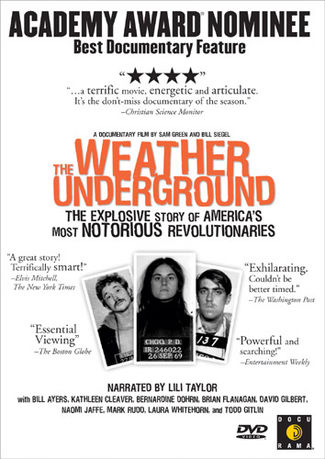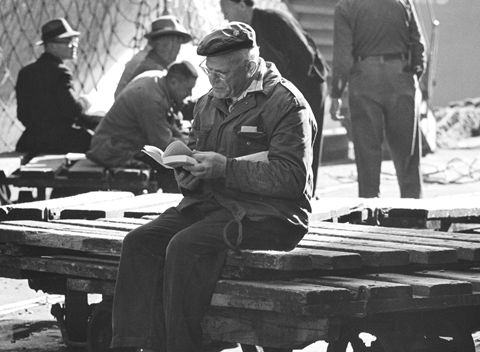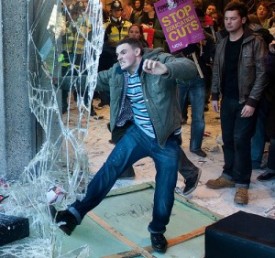(Source: Wikipedia)
Not too long ago I watched the documentary The Weather Underground, about the Weathermen, the violent radical Leftist student group in the 1960s. (The organization recently gained renewed media attention during the 2008 Presidential Election for then-Senator Obama’s association with Bill Ayers, one of the organization’s founders.) The film traces the origins of the organization as an offshoot of the Students for a Democratic Society, its rise as a prominent violent radical catalyst for social and political change in the Marxist light, and its eventual decline and capitulation.
One thing that struck me about the founders of the Weathermen, who all provided illuminating commentary throughout the entire film, was their individual personal and family backgrounds. Each one of them came from relatively affluent and respectable families, and all of them attended prestigious universities. Bill Ayers, for instance, was a student at the University of Michigan, while his father was president and then CEO of Commonwealth Edison, the largest electric utility provider in Illinois, and was on the board of directors and trustees of numerous organizations, such as Northwestern University and the Chicago Cubs. Bernadine Dohrn, who would eventually go on to marry Ayers, earned three degrees, including a Juris Doctor, from the University of Chicago. David Gilbert, Mark Rudd, and Brian Flanagan, the other main ex-Weathermen interviewed, were all graduates of the Ivy League Columbia University.
I could not help but wonder why these kids, who seemed to have it all – a loving family, relative affluence, degrees from top-tier universities – would become such fervent and motivated leaders of an organization that promoted the violent overthrow of the American government. These kids seemed like they had such a bright future, with advantages available only to the upper echelons of American society, yet they chose such a radical path that was antithetical to the social fabric of America.
(Eric Hoffer reading in between breaks on the San Francisco docks. Source: Google Images)
To help me understand this phenomenon, I turned to a book that provides timeless commentary on mass movements and human nature: The True Believer by Eric Hoffer. Writing almost two decades before the creation of the Weathermen, after the collapse of one global violent ideology (Nazism) only to have another one replace it (Communism), Hoffer wanted to explain why an individual felt compelled to join a cause, particularly a violent one. There is one particular passage that seems to shed tremendous light onto the question of the Weathermen:
“People who see their lives as irremediably spoiled cannot find a worthwhile purpose in self-advancement. The prospect of an individual career cannot stir them to a mighty effort, nor can it evoke in them faith and a single-minded dedication. They look on self-interest as on something tainted and evil; something unclean and unlucky. Anything undertaken under the auspices of the self seems to them foredoomed. Nothing that has its roots and reasons in the self can be good and noble. Their innermost craving is for a new life – a rebirth – or, failing this, a chance to acquire new elements of pride, confidence, hope, a sense of purpose and worth by an identification with a holy cause. An active mass movement offers them opportunities for both. If they join the movement as full converts they are reborn to a new life in its close-knit collective body, or if attracted as sympathizers they find elements of pride, confidence and purpose by identifying themselves with the efforts, achievements and prospects of the movement.”
If we are to take instruction from Hoffer, it seems that in spite of their privileged upbringing, the Weathermen had a deep-rooted dissatisfaction of self, a great lack of personal fulfillment. The young leaders of the Weathermen resented their backgrounds and the advantages that it afforded. Watching the film, you immediately recognize their profound disgust with not just American politics – such as the Vietnam War – but with the fundamental American way of life. And it is their association with America, mostly through their parents’ success which enabled their cozy and charmed childhoods, which they wish to remove themselves. They wanted to find a cause that gives them a strong sense of purpose under perceived moral surety, one where they have the feeling of noble selflessness. And during the 1960s, as the American social and political system was being challenged at its most fundamental levels, they found such an opportunity. Thinking they were on the right side of history, overthrowing a discredited way of life, the Weathermen burned with passion and were enamored with their new lives.
(Young rioter in the UK. Source: Google Images)
Looking at the situation of the riotous youths in the United Kingdom and elsewhere, there does not seem to be much in common between them and those of the 1960s. Aside from their menacing violence, the two are motivated by vastly different things. As mentioned above, the youths from the 1960s were motivated by a strong dissatisfaction of self and were contemptuous of their privileged upbringing. And in the turmoil of the American system, which they believed was discredited (America being, as Bernadine Dohrn put it, “the most violent society that history ever created”), they found an organization with the grandeur necessary to give them a strong sense of moral purpose. Today, however, the youths have no such sense of purpose. They are taking the opportunity of recent measures of austerity by their respective governments – which can certainly cause some discomfort in the short-run – to loot stores that sell cellular phones and sneakers, and to cause general mayhem. (Much has been written about this: Theodore Dalrymple’s commentary has been the best in my opinion: here and here. Peggy Noonan also had a good op-ed last week.) Dalrymple summarized what he sees as the cause of the riots in Britain:
“A population thinks (because it has often been told so by intellectuals and the political class) that it is entitled to a high standard of consumption, irrespective of its personal efforts; and therefore it regards the fact that it does not receive that high standard, by comparison with the rest of society, as a sign of injustice.”
So the youths of Britain are not contemptuous of their affluent lifestyles and don’t want to find a sense of purpose in a cause against a discredited system (indeed, the system they’re advocating – the welfare state – has been discredited, hence the measures of austerity). They feel entitled to their lifestyle and are violently acting out when it is taken away – like a child who throws a temper tantrum when a parent takes away his toy.
I hate saying this, but it is probably a good thing that they have no purpose. I say it because these opportunities for temporary material gain won’t last very long. The riots have garnered worldwide attention and the people of Britain won’t put up with it for very long. And hopefully the police – which have been strongly criticized for their laxity – will more strongly enforce the violence and thereby reduce the incentive to riot and loot. Whereas the riotous youths of the 1960s had a strong sense of purpose, which as Brian Flanagan said, “When you feel like you have ‘right’ on your side, you can do some horrific things.” The Weathermen weren’t after an iPhone or expensive pair of Nike shoes. They were after the complete overthrow of the American government and were willing to achieve that goal at any cost, regardless of the amount of bloodshed.



Comments on this entry are closed.